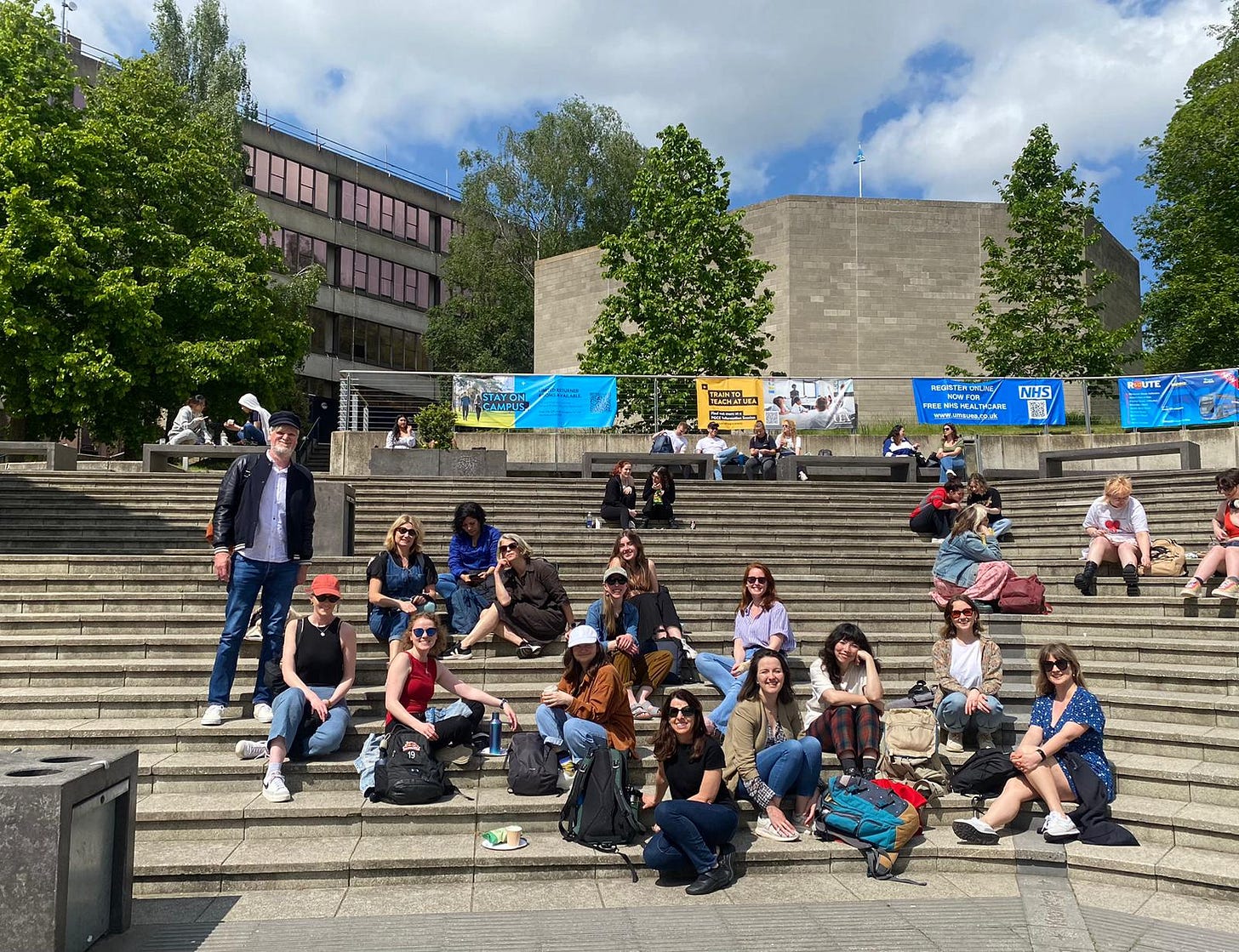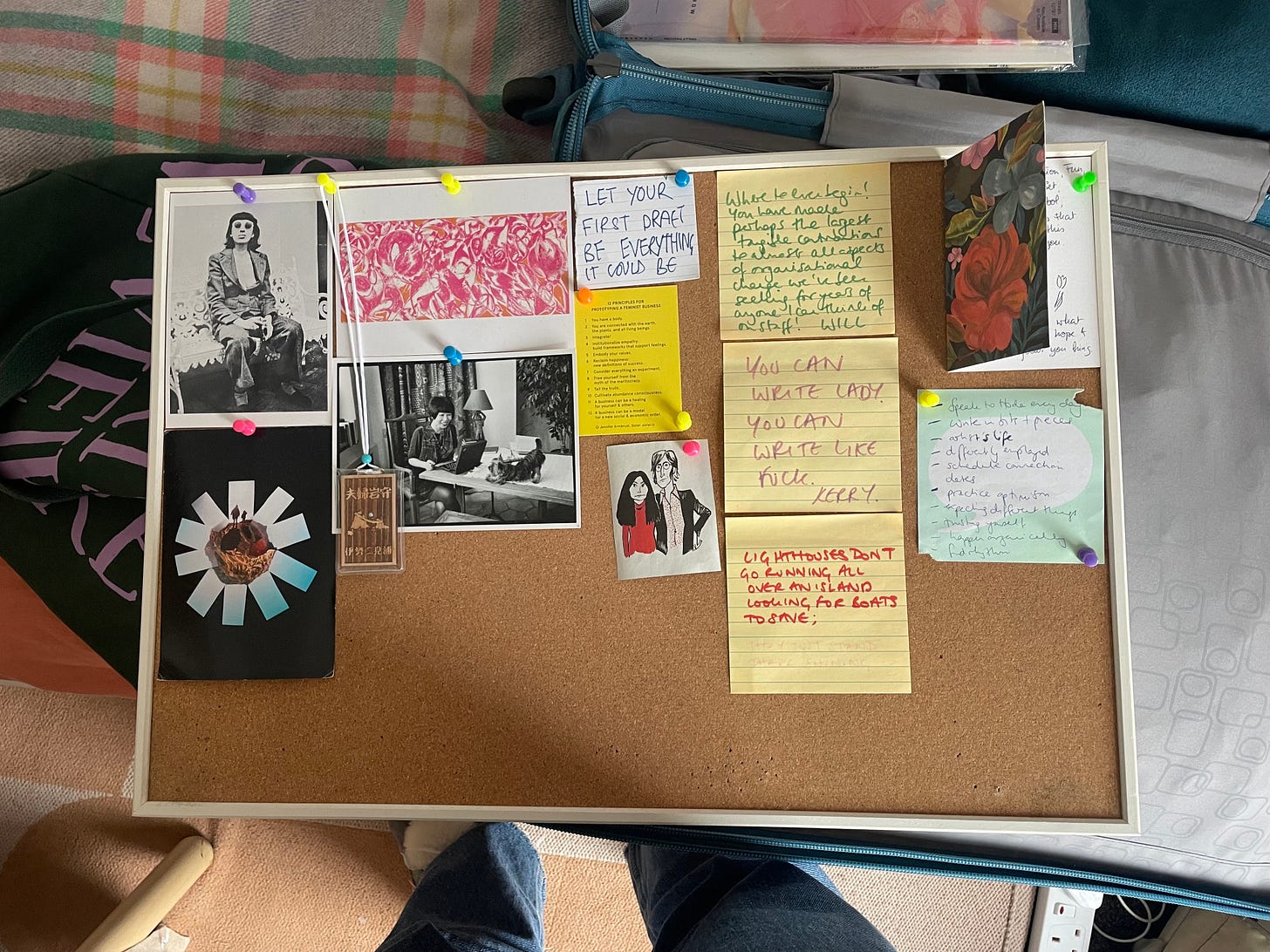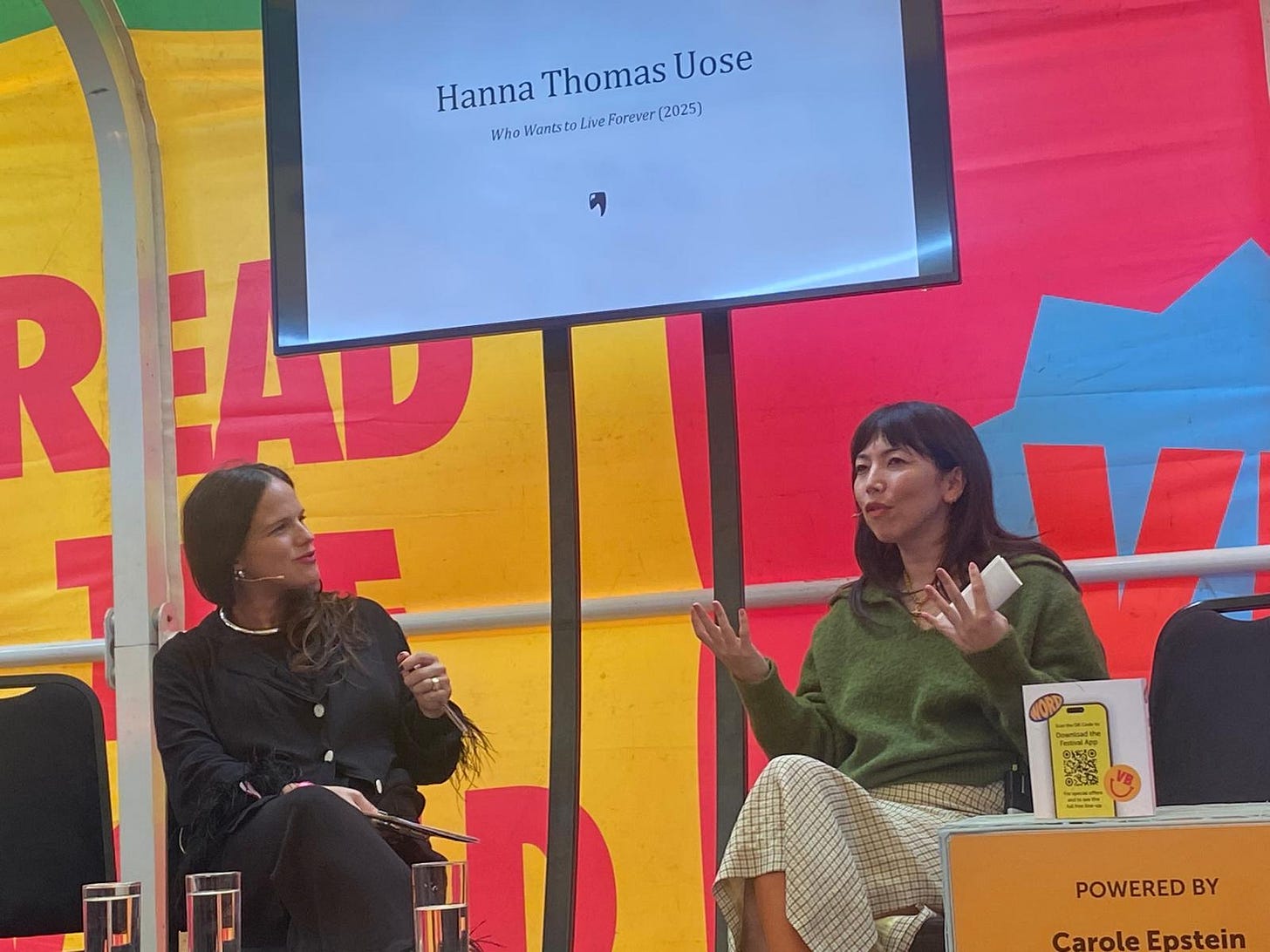I’m Hanna Thomas Uose, a writer and a strategist for the progressive movement. Here I share what I’ve been thinking about (mainly how to make a new world and how we are with each other while we do it). Every quarter, I also send a list of things I’ve enjoyed. Take what you like and leave the rest.
Hello! It is less than one month till my debut novel Who Wants to Live Forever is out in the world! The book publishing process is so long that it feels very strange that the actual day is approaching. I am starting to feel something like excitement instead of (as well as?) the existential threat of exposure. Good news.
A while ago I shared why I wrote the book and then I told the first part of how I wrote the book – how I got the gears in motion to start and maintain the momentum that saw me through that first draft.
Today I want to share a bit more about the feedback process. The origin of this story came to me at a very isolated point in my life and I wrote the first draft (or what some people call the ‘zero’ draft – it was about 44,000 words) in lockdown. After that, things got more interesting! Writing towards a known audience and letting their thoughts jostle with my own was a fairly new experience. I had to learn how to be poked by questions, stay true to my own inner compass and incorporate incredibly useful feedback at the same time.
I started the MA in Prose Fiction at the University of East Anglia in the autumn of 2021, doing it part-time for two years. While there, I dabbled in a couple of different projects but worked mostly on Who Wants to Live Forever and got an agent in the summer of 2023. The book sold that September to the founder of Brazen (an imprint of Octopus Books at Hachette) and true visionary, Romilly Morgan.
This is neither a sales pitch for doing an MA (I don’t think they are strictly necessary) or indeed for selling a book. But the process inherent to both experiences helped me to better translate for the reader the vision that was in my head, to be better understood. And the lessons I learned feel so applicable to other areas of my life – when should someone else’s vision permeate and mingle with my own? How can I become more legible to others (and do I want to)? When will I double down on an idea and when will I let it go? This whole experience has helped me to gather feedback on my novel, yes, but also my entire personality. Thankfully, there is no Goodreads equivalent that will rate my personality (yet).
Here are the main things I learned while writing in the gaze of other people:
There are people who are my readers (and therefore, people who are not my readers)
I have found this thought such a comfort in my daily life and have to return to it regularly now that early reviews are starting to come in for the novel. At UEA I was part of two separate workshop groups of around ten people who would read and feed back on each other’s writing during the term. Out of each group of ten, I feel like I can solidly say there were three people who were my definite readers, who were preoccupied with the same sort of questions I was and who wanted to immerse in the world I had created. Perhaps there were another four or five who had very useful things to say but didn’t quite align when it came to taste or execution. Then there were one or two people who felt actively annoyed about some of the questions I was raising, the actions the characters took and who seemed generally aggrieved that they had to read it at all (honestly, the amount I sweated during some of my workshops – even when the topic was not my own work).
The lesson for me here was to write for my readers, write for those who already understood what I was trying to do and who wanted to see me express my ideas to their fullest extent (as far as I can tell, my readers are broadly people who used to be emos in their teens which is no big surprise!) There were useful nuggets in what the rest had to say, but if I focused too hard on their questions or what they wanted, the book would have been pulled in a completely different direction and would not have remained true to what it wanted to be.
I had to develop my own taste
So how did I remain true to my vision of the book? The best thing the MA did for me was help me to develop my own taste. Of course I already knew who my favourite writers were and my inspirations (I’m generally obsessed with women who overthink their way through autofiction e.g. Sheila Heti and Rachel Cusk or speculative writers like Emily St. John Mandel and Catherine Lacey), but feeding back on other people’s work line by line helped me to build up my skill and understand better how a scene was constructed. I am not perfect now by any means – this is my first book after all – but I can’t think of any better training in learning how to write than learning how to edit.
Listen to the book
Inevitably and thankfully my editor is my reader (and I strongly suspect she was a teenage emo – Romilly please confirm). In our first conversations she name-checked other books and artworks that have inspired me and that I could only dream to sit alongside – Tomorrow and Tomorrow and Tomorrow by Gabrielle Zevin, Normal People by Sally Rooney and the film Everything Everywhere All At Once. I knew we were on the same page and had strongly overlapping taste (now is the time to mention the absolutely barnstorming Brazen list this year: the upcoming Bare by Lorna Tucker and Maggie; or a man and a woman walk into a bar by Katie Yee are both sensations).
Still, there were moments when I feared the collaborative process might steer me into choices I didn’t want to make. After each editorial letter, I sat with the notes for a week before beginning again, letting my subconscious grapple with each big picture suggestion. Often I would agree with the diagnosis – a certain scene, character or sequence was posing a problem – but I needed to find my own way to the solution. Finding myself in this situation towards the end of the editing process, I turned to who would know best: the book. I wrote the book a letter (something I had done every now and then over the years), asking its advice about a new key scene. Immediately, the answer came back – it was obvious and also an idea I could not have thought my way into. It had to arise from the depths! Thank god it did because that scene now ties the whole book together.
I think that’s it! If there are any questions you have about the process and the book (or indeed, your process and your book?) please drop me a line. Perhaps I will do a Q&A post down the road. I also have plans to share more about my path to publication and how the book got its wonderful neon cover! More soon!
Just a reminder that you can pre-order from lots of good places! And I am doing a nice number of events across London, Oxford, Edinburgh, Folkestone, Canterbury, Manchester, Norwich and Surrey, with more to come! Lastly, I am running a free online writing workshop in return for pre-orders on Saturday March 22nd (or you can receive the recording). More details here!
Love and solidarity as ever,
Hanna








I bought your book yesterday in Folkestone and started reading today. I'm not even at page 40 yet but your words have already made me smile and wonder a question or two. What you have written above (and in Part 1) has been an interesting insight into your writing journey - a journey that has occurred in a similar time frame to my own - but with a lot of differences in the experience ... and the occasional similarity. I never wrote a letter to my first novel, but I will not forget the first time it spoke to me. I had got to the end of Chapter 10 in the first draft. I had no idea what was next ... and wasn't too bothered as far as I can remember. I don't think I was puzzling about how the story was to continue or anything like that but, as was my routine, sat down to write. I probably read the last bit of what I had written the day before and typed "Chapter 11". Then, for no conscious reason, I wrote: "The bomb was unexpected". And it really was unexpected. I didn't know it was coming. My characters didn't know it was coming - and neither they, nor I, knew where its consequences were leading. I hadn't lost control of the book. It wasn't writing itself ... but, with that sentence, it became my writing partner.